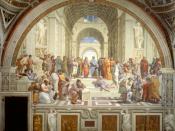How valid is Burckhardt's assessment of the role of humanism in Renaissance culture? The term "ÃÂRenaissance' is adopted from the French equivalent of the Latin word "ÃÂrinascere', which literally means "ÃÂrebirth'. It describes the radical and comprehensive changes that took place in European culture during the 15th and 16th centuries. It brought about the demise of the Middle Ages and embodied, for the first time, the values of the modern world. The consciousness of cultural rebirth was itself a characteristic of the Renaissance. Italian scholars and critics of this period claimed that their age had progressed beyond the barbarism of the past and had found its inspiration, and its closest parallel, in the civilisation of ancient Greece and Rome.
The founder of Renaissance humanism was Petrarch (1304-74), an Italian poet and man of letters who attempted to apply the values and lessons of antiquity to questions of Christian faith and morals in his own day.
By the late 14th century, the term studia humanitatis ("humanistic studies") had come to mean a well-defined cycle of education, including the study of grammar, rhetoric, history, poetry, and moral philosophy, based on Latin authors and classical texts.
Historians are pretty much agreed on the general outlines of those mental attitudes and scholarly interests that are assembled under the rubric of humanism. The most fundamental point of agreement is that the humanist mentality stood at a point midway between medieval supernaturalism and the modern scientific and critical attitude. Medievalists see humanism as the terminal product of the Middle Ages. Modern historians are perhaps more apt to view humanism as the germinal period of modernism.
Although the term was originally referred to the revival of the values and artistic styles of classical antiquity during that period - especially in Italy - to Giovanni Boccaccio in...


